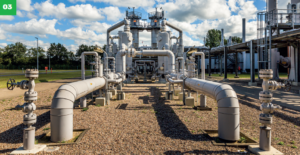Catherine Gras, CEO of Storengy UK and Germany, examines the options
THE ROLE OF NATURAL GAS STORAGE TODAY
Underground storage is a crucial component of today’s natural gas markets. Storage brings a number of benefits to gas users. A storage is a tool to manage efficiently volume and price risks, storing energy when it is less needed and when prices are lower, and taking it back when there is a higher consumption or when prices are higher. In addition to risk management, storage also allows to reduce the overall cost of the gas system and to manage temporary disruption in supply routes.
Without storage, the gas sector would not have been able to develop strongly in Europe in recent decades, providing affordable and reliable energy to all end users.
Today around 25% of the European gas consumption can be stored underground.
Catherine Gras
THE ROAD TO DECARBONISATION IMPLIES A GREATER NEED FOR STORAGE
To reach their decarbonisation targets in 2030 and 2050, all European countries must change fundamentally their energy system, replacing fossil fuels by greener energy sources.
For decades, our energy has been based on predictable production facilities, on predictable sources of energy. Electricity was mostly produced close to the point of use with coal, nuclear, gas or fuel-oil and heat was mostly produced from gas. The largest uncertainty of such a system was on the demand side.
In most countries in Europe, decarbonisation relies on the rapid increase of renewable intermittent energy. In such a system, uncertainties are not only on the demand side but significantly also on the supply side.
This shift in the way we produce electricity is creating a strong demand for flexible power plants – initially gas power plants and in the future more and more on hydrogen power plants – and on energy storage, to a significant extent.
Energy needs to be stored in different manners and on different time frames. Underground storage can provide flexibility services ranging from intraday needs to seasonal needs.
HYDROGEN STORAGE WILL BE A KEY ENABLER OF A DECARBONISED ECONOMY
In the next decades, hydrogen usage will develop in two main directions: in hard to abate sectors, i.e. some industrial sectors and parts of heavy mobility and as a backup to the electricity sector.
On one side, demand will be a combination of rather flat industrial needs and erratic needs for hydrogen used as a backup of the intermittent electricity production.
On the other side, supply of hydrogen will depend on the way it is produced. Blue hydrogen produced out of natural gas will have a rather predictable level of production, whereas green hydrogen, based on renewable energy, will be more unpredictable. The reliability of the supply side will also depend on the location where hydrogen is produced, close to consumption sites or further away.
To manage the mismatches between demand and supply, hydrogen storage will be key. In the ramp-up phase of the hydrogen economy, we consider that the role of hydrogen storage in securing reliable supply will be even more important than the current role of natural gas storage in the gas market.
THE POTENTIAL TO STORE HYDROGEN UNDERGROUND IN EUROPE
Different types of underground reservoirs are today used to store natural gas: salt caverns, former gas and oil reservoirs – depleted fields – and aquifers. There are already salt cavern storage sites in operations in the UK and the US. Repurposing, extending or creating new salt cavern storage sites for hydrogen is the obvious next step in Europe.
Based on forecasts for hydrogen demand in Europe in the next fifteen years, the need for underground storage at that horizon might exceed the repurposing potential of existing sites and new investments will need to come online.
A number of research projects are already working on the feasibility of storing hydrogen into depleted fields and aquifers. That will hopefully increase the potential, especially in countries in Europe where the geology is not adequate for salt cavern developments.
Storengy’s Harsefeld site in Niedersachsen, Germany
TIMING IS OF THE ESSENCE
Developing a whole infrastructure to support the emergence of a large hydrogen demand will be key for countries betting on this solution to decarbonise their economy.
Such an infrastructure will be based on production, transport and storage sites. These are significant investments with long development times. There are currently lots of R&D and pilot projects, and the next challenge is to transform this into larger commercial projects.
Industrial companies have their role to play in investing in the early phase and preparing for significant investments to come. It is the responsibility of regulators and governments to make it happen. There are two important aspects in this: put in place a market design that will give confidence to investors, future suppliers and future customers and ensure permitting processes are efficient so that developments are not unduly delayed.
For more information:
Catherine Gras has been Storengy UK and Germany CEO since 1 October 2018. Storengy is a fully owned subsidiary of ENGIE and the largest underground storage operator in Europe with activities in France, Germany and the UK. Gras holds a Master’s degree from the French ESSEC Business School. Before joining the ENGIE Group, she worked for a private equity fund and the auditing company KPMG. Gras will give a presentation on the subject of hydrogen storage at the StocExpo conference, held from 23-25 May 2022 in Rotterdam, the Netherlands.
www.storengy.de
www.stocexpo.com













